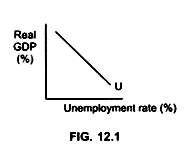Definition:
Labour force consists of all persons working and all persons though not working, are searching for work.
One who is not in the labour force cannot be employed. According to A.C. Pigou “Unemployment means, all those who are willing to work are not able to find job”.
An unemployed person is defined as:
(i) Who has actively looked for work during the previous four weeks, or
ADVERTISEMENTS:
(ii) Is waiting to be recalled to a job after being laid off, or
(iii) Is waiting to report for a new job within four weeks.
Characteristics of Unemployment:
(i) Large variations in unemployment rate across groups based on age, race, experience.
(ii) High turnover is observed in the labour market.
ADVERTISEMENTS:
(iii) This turnover is mostly cyclical. Layoffs and separation are high during recession and voluntarily quits are high during booms.
(iv) Some unemployment may be for a short period of time while some unemployment may be for a long period of time.
Cost of Unemployment:
1. Lost Output:
This is the largest single cost of unemployment. Society loses because the economy is not operating at full employment level. Arthur Okun showed inverse relationship between unemployment and output over the business cycle. Okun states one extra point of unemployment costs 2% of GDP. A recession can cost 3 to 5% of GDP leading to losses of hundred billion of US$.
2. Distributional Impact:
Unemployment widens the inequality of income and wealth. Okun Law states – “1% point increase in unemployment rate is accompanied by 2% point increase in unemployment rate among the blacks.” It implies that unemployment hits poor harder than the rich.
The total loss caused due to unemployment could be distributed among different people in different ways. For example, if an unemployed receives benefit payments which is close to the income received while he was employed, he will not suffer loss of income from being unemployed, but the society will lose because the total output reduces. Thus, the unemployment compensation, partially spreads the burden of unemployment.
3. Loss to the Society:
One possible benefit of unemployment is that by not working; people will have more leisure. But, it is an unwanted leisure. This is because when a person is employed he pays taxes on his wages, but when he is unemployed he pays no taxes. As a result, tax revenue decreases. This is a loss to the society.
